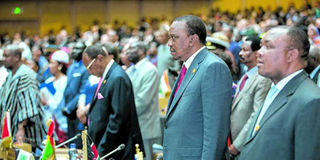Leaders turn blind eye to Africa’s problems in pursuit of immunity

President Uhuru Kenyatta follows proceedings during the opening ceremony of the 26th African Union Heads of State and Government Summit in Addis Ababa, Ethiopia. PHOTO | AFP
What you need to know:
- The 26th African Union Heads of State Summit convened in Addis Ababa last week with an overloaded agenda.
- Across the continent, bloodthirsty terrorists are wreaking havoc in the name of violent Islamic extremism.
- In Somalia, Al-Shabaab retains the capacity to strike and kill with impunity, despite the best efforts of an AU peacekeeping force.
- Libya, in North Africa, is imploding from within on the back of the western-led ouster of strongman Muammar Gaddafi, that served only to create a vacuum and for the sprouting of terrorist ideologies.
The 26th African Union Heads of State Summit convened in Addis Ababa last week with an overloaded agenda.
Burundi is threatening to regress into civil war and genocide, forcing the continental body to seriously consider the unprecedented step of despatching a military intervention force against the objections of President Pierre Nkurunziza.
Across the continent, bloodthirsty terrorists are wreaking havoc in the name of violent Islamic extremism. In Somalia, Al-Shabaab retains the capacity to strike and kill with impunity, despite the best efforts of an AU peacekeeping force.
The terrorist group is also a menace across the border here in Kenya, where it will occasionally launch attacks, with devastating consequences.
Nigeria has been unable to contain the threat posed by Boko Haram, which has been able to spread its terrorist attacks to neighbours such as Cameroon, Chad and Niger.
In Mali, another violent extremist group reigns over large sections of the country that once was a proud centre of African scholarship and technology.
Burkina Faso, until recently a model of stability in a tumultuous region, recently just survived a military coup, and then was hit with its first serious terrorist attack.
IMPLODING FORM
Libya, in North Africa, is imploding from within on the back of the western-led ouster of strongman Muammar Gaddafi, that served only to create a vacuum and for the sprouting of terrorist ideologies.
Africa’s newest independent country, South Sudan, is another AU member-state experiencing serious internal conflict, alongside others such as the Democratic Republic of Congo and the Central African Republic.
There is a lot that needs fixing when thousands of Africans are ready to risk the lives on rickety boats in desperate search of peace, security and the chance to earn an honest living in Europe.
The leaders of the continent gathered in Addis Ababa with a lot to pay heed to.
So what did they do? They chickened out on Burundi. They came out with a lot of empty words but did nothing on Al-Shabaab, Boko Haram, Libya, South Sudan, Mali, and all the other countries and regions where people cannot enjoy peace.
The African leaders had nothing for those citizens of Africa who, to quote Thomas Hobbes, are condemned to “continual fear, and danger of violent death; and the life of man [is] solitary, poor, nasty, brutish and short”.
DEMAND FOR IMMUNITY
Instead, the highlight of the Summit, for Kenya at least, was a demand for immunity for African leaders who brutalise their own people.
It was a proposal for en-masse withdrawal from the international statutes that try to ensure punishment for those who may be guilty of mass murder, genocide, ethnic cleansing, and other high crimes.
The proposals by President Uhuru Kenyatta were given a misleading spin by his press service to suggest that they had been unanimously adopted, but closer examination reveals there was no such resolution.
All the same, the response indicates that African leaders were happy with the threat to quit the International Criminal Court if it does not drop crimes against humanity charges facing our Deputy President William Ruto and radio presenter Joshua Sang.
Mr Kenyatta and three other prominent Kenyans have previously been freed by the same court on charges arising out of the 2007-2008 post-election violence.
The President and his deputy were elected on a promise that the ‘personal challenges’ would not affect their ability to run the country.
But once in office they converted personal challenges to the national, and then the continental, agenda.
FOREIGN POLICY
Kenya’s entire foreign policy is now built on fighting the ICC, creating the false narrative that the country is on trial and that national sovereignty is threatened because of criminal trials facing two individuals.
That is selfish promotion of impunity.
Now, I have no doubt in my mind that Mr Ruto and Mr Sang will walk free. From the moment I attended the opening of their case at The Hague and listened to the opening statements, I concluded that Prosecutor Fatou Bensouda was clutching at straws.
However, it will be up to the court to reach a verdict, and it must be protected from political lynch mobs.
Mr Ruto publicly elected to face the ICC, and he must not now be denied the opportunity to establish his innocence. Any discharge out of subversion of the judicial process will leave him forever stained.
[email protected]: @MachariaGaitho





